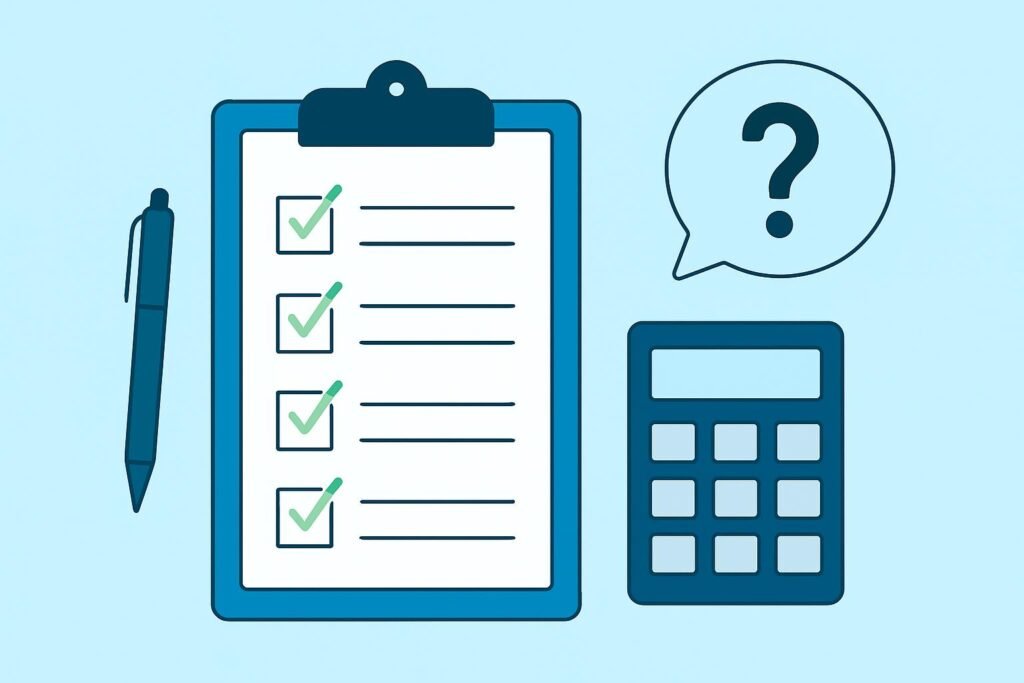
Choosing an accountant is a big step, especially when you’re running your business on your own.
A good accountant won’t just file your tax return for you – they’ll help you make better decisions, keep on the right side of HMRC, and possibly save you thousands over the years.
But how do you tell a helpful expert from someone who sends out templated emails once a year and is virtually impossible to contact?
These 15 questions from the ByteStart team will help you cut through the noise and find someone who genuinely understands your business and the tax needs of sole traders.
Start by working out what you need
Before speaking to anyone or compiling a short list, carefully consider the accounting support your business needs.
Do you just want help with your Self Assessment? Or do you need guidance on VAT registration, expenses, MTD-compatible software, or even whether to become a limited company in the future?
It also helps to decide whether you want ongoing support throughout the year, or help at tax return time – usually in January.
For more help working this out, see our guide: Do you need an accountant as a self-employed person?
1. Do you work with other sole traders like me?
Not all accountants understand the specific quirks of self-employment.
Ask if they work with people in your line of work – whether that’s trades, ecommerce, creatives, or part-time freelancers.
If they primarily work with limited companies or large clients, they might not be the right fit.
2. Can I speak to one of your existing clients?
Don’t just take their word for it – ask to speak to a client they already work with, or read some trustworth testimonials.
Check out their ratings on Google Search and Trustpilot – these are often useful indicators if you need to filter out firms with a less-than-impressive reputation.
3. How do you usually communicate with clients?
Some people prefer phone calls. Others are happy doing everything by email or app.
Make sure they work in a way that suits you.
If they use software like the market-leading FreeAgent or Xero, find out how they integrate with it – and read our guide: Do you still need an accountant if you use FreeAgent or Xero?
4. Will I deal with one person or a whole team?
It’s good to know whether you’ll have a consistent point of contact. Some firms hand you over to different staff each time.
Others give you one dedicated person who gets to know your business properly.
Again, would you feel happier with a small accountancy firm, or are you happy with a more corporate, less personal touch?
5. Can you explain how a specific rule affects me?
To test out a prospective accountant, ask some specific questions: Can I backdate business expenses? Should I use simplified expenses? What’s the best way to handle income from Etsy and PayPal?
Their answer will give you a sense of how helpful and practical they are – or whether they offer generic advice.
6. Are you happy to review how I currently do things?
If you’ve already started trading, see if they’re willing to look at your record-keeping, app setup, or previous tax returns and point out anything to improve.
A good accountant won’t charge you to give basic pointers.
7. How do you help clients stay on top of deadlines?
Late submissions can lead to HMRC penalties.
Ask whether they’ll send reminders for Self Assessment, VAT, or payments on account – or whether they expect you to keep track yourself, or rely on accounting software.
If you’re affected by MTD for Income Tax, this is especially important — see our guide to Making Tax Digital for sole traders.
8. What would you do to help me keep more of what I earn?
This is where a good accountant earns their fee. Ask what steps they’d take to reduce your tax bill legally – whether that’s through allowable expenses, pre-trading costs, home office use, or longer-term planning.
9. What do you charge, and what’s included?
Always get a clear answer here. Do they offer a flat monthly fee? Charge per return? Bill by the hour? And what exactly does that include – just submitting your tax return, or advice and support throughout the year too?
Use our guide to get a feel for what’s reasonable: How much should you pay for an accountant if you’re self-employed?
10. How do you stay up to date with tax changes?
Tax rules change regularly – from MTD to income tax allowances and thresholds. Ask how they stay informed, and how they’ll pass that info on to you. It’s no use if they only tell you when it’s too late to act.
11. What do you see as the most significant risks in my type of business?
This question often separates the great accountants from the average ones. They should be able to spot things you might not have considered, such as cash flow issues, VAT pitfalls, or underclaiming expenses.
Are they proactive, or will they do the bare minimum?
12. Do you recommend specific software or tools?
Ask what they recommend for record-keeping. Do they integrate with Xero, FreeAgent, QuickBooks, or other accounting software? Will they provide you with access as part of their service, or will they charge an extra fee?
If you’re unsure which route to take, see our guide on accounting software vs spreadsheets.
13. Are there any conflicts of interest I should know about?
If they also do the books for a direct competitor, that could be awkward. It’s not always a deal-breaker, but it’s good to know upfront. This is likely to apply to larger businesses.
14. Why should I choose you over other accountants?
They don’t need to pitch you like a Dragon’s Den contestant, but they should have a clear answer here. If they can’t explain what makes them different, that might tell you all you need to know.
15. Will you explain things in plain English?
Finally, trust your gut instinct. If they speak in jargon, won’t slow down to explain, or make you feel daft for asking questions, they’re not the right fit. A good accountant makes things easier – not more confusing.
Some final thoughts
These questions will help you make a fair, informed decision – not just go with the first accountant who replies to your email.
Get quotes from two or three people and look at the whole picture, not just the price.
And if you’ve already got an accountant but something doesn’t feel right, don’t be afraid to move on. Read our guide on how to switch accountants without the stress.
To compare some leading providers, visit our guide to sole trader accountants.
If you’re running a limited company, here’s a separate guide to choosing a limited company accountant.




